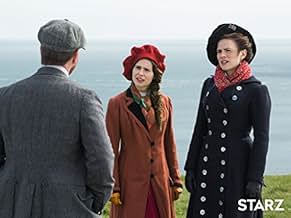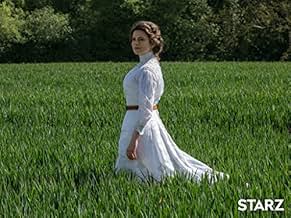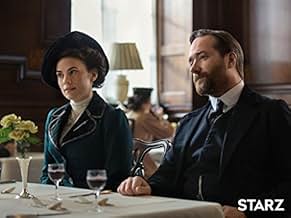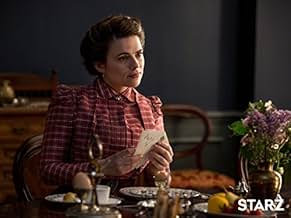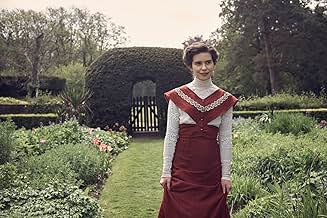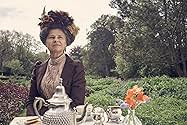Die sozialen und Klassenunterschiede im England des frühen 20. Jahrhunderts am Beispiel dreier Familien - der wohlhabenden Wilcox', der sanften und idealistischen Schlegels und der Basts aus... Alles lesenDie sozialen und Klassenunterschiede im England des frühen 20. Jahrhunderts am Beispiel dreier Familien - der wohlhabenden Wilcox', der sanften und idealistischen Schlegels und der Basts aus der unteren Mittelschicht.Die sozialen und Klassenunterschiede im England des frühen 20. Jahrhunderts am Beispiel dreier Familien - der wohlhabenden Wilcox', der sanften und idealistischen Schlegels und der Basts aus der unteren Mittelschicht.
- Nominiert für 1 BAFTA Award
- 1 Gewinn & 12 Nominierungen insgesamt
Folgen durchsuchen
Empfohlene Bewertungen
I fell in love with Emma Thompson's portrayal of Margaret Schlegel in the 1990s film version. I loved the film as a whole. But this version is just as worthy, and being a four-hour series, can embrace a larger picture and more importantly, a larger canvas of characters.
Leonard Bast is central to the plot, but in the film, he was a cipher, a vessel and a canvass for the sisters to paint. I read the book and while women of their class might have seen him that way, I didn't, and I liked that he was given more of a presence and personality. In the film there was no real connection between him and Helen, while in this version, there is one, however tenuous and fleeting. I felt it gave him the respect he deserved, and in doing so strengthened the underlying message.
I also preferred this version of Henry. Hopkins is brilliant, but to me, Margaret's attraction to him in the film made little sense. No, not even in Edwardian times. She was fierce and self-possessed, he was dull and rigid, and she didn't need his money or stamp of approval. I needed to buy the connection and this version made it breath so much more freely. Not even Emma Thompson can convince me of something unpalatable.
Some stories just need more time to unfold. Four hours worked well enough, whereas two and half, or even three, didn't. I still love the film version and Helena Bonham Carter is just irreplaceable, but Philippa Coulthard makes a great Helen too People who want to have an issue with Jackie Bast or a few servants or doctors being minorities can fuss away about it all they want. It might be historically unlikely, but it is by no means historically "incorrect" and it shouldn't jar anyone who is paying attention to what matters in the story. If anything it adds to it.
I loved this version. Kudos to all involved, especially Atwell, Coulthard, McFadyen, and the young actor playing Tibby. Oh, and Ullman. It can be scary to take on a classic that has supposedly been "claimed" by film deities. They did it proud.
Leonard Bast is central to the plot, but in the film, he was a cipher, a vessel and a canvass for the sisters to paint. I read the book and while women of their class might have seen him that way, I didn't, and I liked that he was given more of a presence and personality. In the film there was no real connection between him and Helen, while in this version, there is one, however tenuous and fleeting. I felt it gave him the respect he deserved, and in doing so strengthened the underlying message.
I also preferred this version of Henry. Hopkins is brilliant, but to me, Margaret's attraction to him in the film made little sense. No, not even in Edwardian times. She was fierce and self-possessed, he was dull and rigid, and she didn't need his money or stamp of approval. I needed to buy the connection and this version made it breath so much more freely. Not even Emma Thompson can convince me of something unpalatable.
Some stories just need more time to unfold. Four hours worked well enough, whereas two and half, or even three, didn't. I still love the film version and Helena Bonham Carter is just irreplaceable, but Philippa Coulthard makes a great Helen too People who want to have an issue with Jackie Bast or a few servants or doctors being minorities can fuss away about it all they want. It might be historically unlikely, but it is by no means historically "incorrect" and it shouldn't jar anyone who is paying attention to what matters in the story. If anything it adds to it.
I loved this version. Kudos to all involved, especially Atwell, Coulthard, McFadyen, and the young actor playing Tibby. Oh, and Ullman. It can be scary to take on a classic that has supposedly been "claimed" by film deities. They did it proud.
... I much preferred the 1992 Emma Thompson/Anthony Hopkins/James Ivory movie version. Perhaps I'm too much a fan of Merchant Ivory films. It's a pleasure watching Matthew Macfadyen in anything. And I look forward to future roles for Hayley Atwell. It's not that this mini-series version is inferior. It simply didn't arouse as much of my sympathy for any of the characters as the 1992 version.
Hayley Atwell enchants in this brilliant and faithful BBC adaptation of EM Forster's great novel. All of the actors are very convincing in their portrayal of multi-faceted characters. I didn't want the show to end. It's a thorough examination of class and social mores, and the message is not lost in time and very much relevant today in the debate between liberals and conservatives. The human spirit, compassion and love prevail. A must-watch for period drama fans like me.
I really have enjoyed the series but some of the casting just is so out of place it's incredibly distracting. At first I was confused by the doctor treating an upper middle class family in Edwardian England being Asian. Then with the servant being black which would have been extremely unusual but not entirely implausible. But then with an interracial marriage that raises NO eyebrows? It stretches incredulity and pulls you directly out of the story.
Colorblind casting only works when it's not impossible in the actual story. In this case it's so improbable it's distracting. I don't understand the thought process involved in casting a classic like this. Especially where it would make massive changes to the story if the characters are not white as that was the reality of the era.
That said, the cast handled their jobs brilliantly and it was charmingly done.
Colorblind casting only works when it's not impossible in the actual story. In this case it's so improbable it's distracting. I don't understand the thought process involved in casting a classic like this. Especially where it would make massive changes to the story if the characters are not white as that was the reality of the era.
That said, the cast handled their jobs brilliantly and it was charmingly done.
Although I felt the 1992 film was so good that it couldn't be improved on, I found this TV version surprisingly good and the four hours hardly seemed enough to contain all the strands of the story. The acting was perfect, neither overdone nor underdone. As it happens, I live in Stevenage and know the location of Howards End well. The location used was somewhere else of course but I thought it was quite like the original could have been in 1890 when the author would have known it, and perfect for the purposes of the drama. I sympathise with the points people make about black servants and so on, but whether or not these exist in the book, they are certainly quite plausible for the time. The winner for me was E.M. Forster again, as it was in 1992, but I will miss the programme and wish there could be a sequel - perhaps another Passage to India. It's indeed a pity that Forster stopped writing novels so soon, as with his understanding of social mores and change, he would have been a good person to write about the 1930s or 1940s. The last hour was for me a blissful one.
Wusstest du schon
- WissenswertesHayley Atwell and Matthew McFadyen worked to together in "The Pillars of the Earth" in 2010.
- VerbindungenReferenced in Honest Trailers: The Oscars (2017) (2017)
Top-Auswahl
Melde dich zum Bewerten an und greife auf die Watchlist für personalisierte Empfehlungen zu.
- How many seasons does Howards End have?Powered by Alexa
- What is a "protein builder?" In episode 2, Miss Schnegel takes Mr. Wilcox to an avante-garde restaurant where they serve "protein builders" and "reform food."
Details
- Erscheinungsdatum
- Herkunftsländer
- Offizieller Standort
- Sprachen
- Auch bekannt als
- 霍華德莊園
- Drehorte
- Myddleton Square, Clerkenwell, London, England, Vereinigtes Königreich(Schlegels' house)
- Produktionsfirmen
- Weitere beteiligte Unternehmen bei IMDbPro anzeigen
Zu dieser Seite beitragen
Bearbeitung vorschlagen oder fehlenden Inhalt hinzufügen









